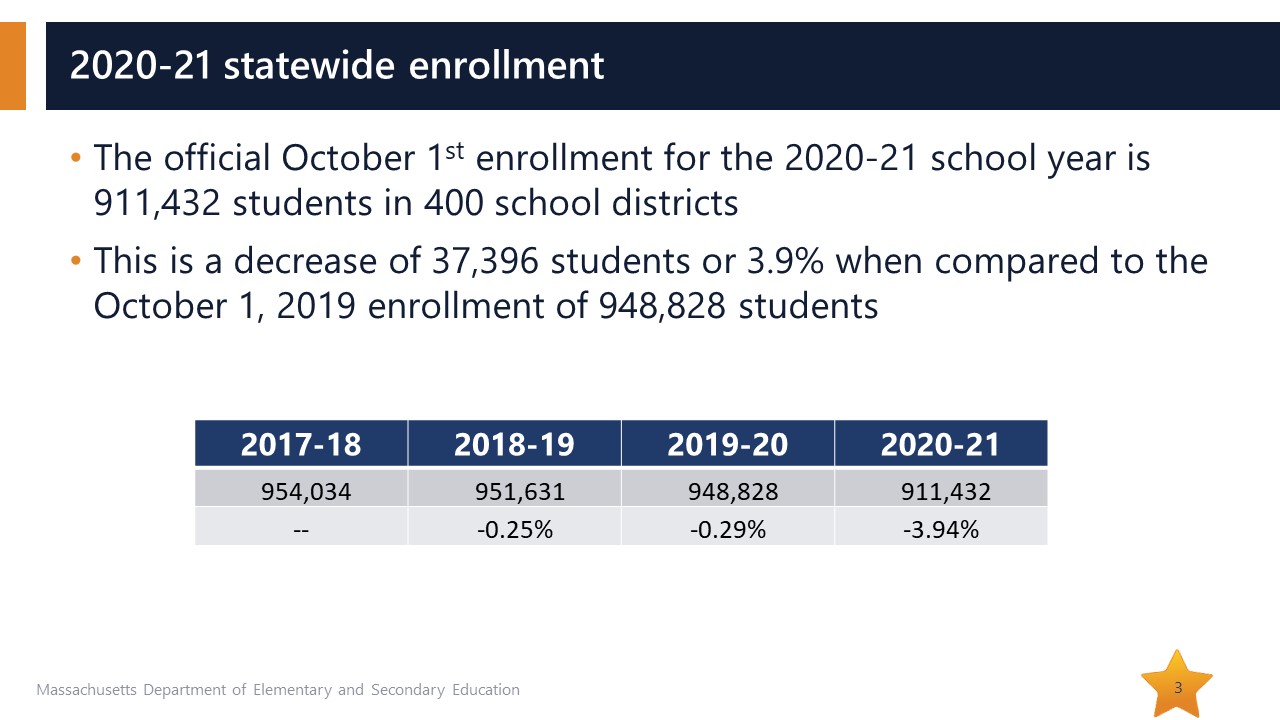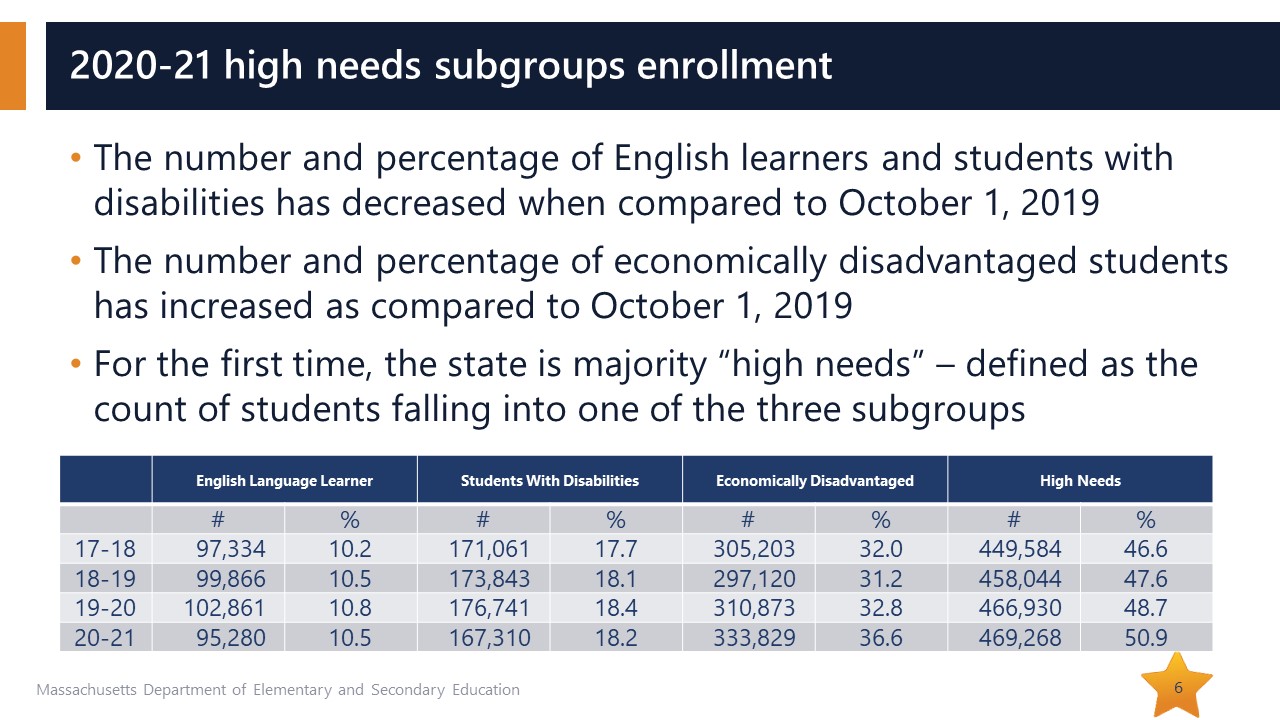
Search
Public Policy Updates: November 2020 Board of Elementary and Secondary Education meeting
- Details
- Published on Sunday, 29 November 2020 21:00
The Board of Elementary and Secondary Education held their regular November meeting on Tuesday, November 24 at 10 am in Malden. The agenda can be found online here; the livestream is here.
The meeting opened with public comment, most of which addressed the gifted item on the agenda. This included a math teacher from Brockton who spoke not only of the importance of students being challenged, but also of their having teachers that look like them in their classrooms. Public comment also included two eighth grade students, one from Revere and one from Brockton, who had been part of the Biggest Winner Math Challenge as described later. THey spoke of their love of mathematics, of the joy they found in begin challenged, and of the realization that "there are students like me across the state."
A teacher from Springfield also called the Board's attention to the logistical challenges of holding MCAS for schools that are fully remote. Citing transportation, proctoring, lost instructional time, she asked, "please do not add more stress and inequities to our urban districts" during this pandemic by conducting such testing.
The Board also heard public comment from superintendents and an alum of two vocational districts, asking that admission requirements not be changed, and that the state instead focus on both expanding vocational schools themselves, their partnerships with their sending districts, and their after-school programming offerings.
Chair Katherine Craven introduced the new student member, Jasper Coughlin, a senior at Billerica High School. She also announced that the evaluation committee has been named for this year, consisting of herself, Vice-chair James Morton (who chairs), and member Amanda Fernández.
Secretary James Peyser used his opening comment time to "reiterate" what he, the Commissioner, and the Governor have been saying "even since last summer," insisting "it is even more self-evident" that students need to be in school for as much time as possible, and arguing the "quality and quantity of learning online is falling far short of what happens in the classroom." He again said that there is a "growing body of evidence that schools are not a source of COVID spread" when protocols are followed, and that "this is true even in communities with higher case loads." He cited the mobile testing units, rapid testing kits, and state contact tracing as things that should give parents and staff "further comfort." He also said it is "increasingly clear that greater risk can be related to at-home environments that aren't always as well supervised or as full compliant with health and safety protocols as schools are." He did not reference any particulars. He said the "bottom line is we need to redouble our efforts to reopen classrooms for in-person learning...At the same time, we must also stay the course on administering statewide assessment next spring, to ensure we get accurate, timely...data on student learning and student learning loss during this unprecedented school year."
The Board then took the item amending the regulations on educator licensure out of order. Commissioner Jeffrey Riley reminded the Board that this is to give additional flexibilities during the pandemic.it allows for additional time for a teacher to teach outside of their certification field and it changes the length of time for someone to be considered a long-term sub. The Board asked for some clarification on timing. Member Marty West also asked if there were any option for research into outcomes; it is, we learned, included in an RFP which is out right now, so it will depend on what of that is taken up. The item passed unanimously.
The Commissioner then gave a brief update, commenting that DESE has continue to inform schools about developments in COVID-19, for example, the rapid test for those who are symptomatic. Schools continue to follow DESE order on masks, as schools are sector-specific guidance within the broader state orders. The Department continues to "prioritize in person learning across all color-coded categories" with grey, green, yellow "learning in-person if feasible" and red prioritizing high needs students. Districts with the highest levels of concern--"for example, Lawrence and Chelsea"--the Department "will work with local health officials." He continued "fully remote instructional models obviously should only be implemented as a last resort."
He also then briefly spoke about a coming model of internships in teaching for seniors in high school.
Assistant Commissioner Russell Johnston then presented statewide enrollment data. This is the October 1 data, which annually districts are required to certify to the Department for use in the coming year. The major change this year is a drop in enrollment of 3.94%, in contrast with prior year drops of 0.25% and 0.29%; the change in student enrollment overall is 948,828 students to 911,432 students. 
The drop is concentrated at the youngest grades, with nearly half--46%--in preschool and kindergarten alone:

Where have they gone? In state private schools, out of state private and public schools, as well as large numbers homeschooling:

The out of state transfers are thus fairly consistent, but the in-state private and homeschooling have both seen significant jumps.
There have also been some changes in subgroups, with the "high needs" group breaking 50% of the student enrollment for the first time: 
Secretary Peyser asked if the missing 7000 students were missing or "effectively truant?" Nothing that truant students would show up in these numbers, as they are enrolled but not participating, the Assistant Commissioner said that the state is quite effective at keeping track of students within the state. It thus is students who have moved out of state or even out of the country, who may well have not had their transfers processed or who may be wishing to participate through a remote model that are those not included in the count. Students may well simply have not informed districts where they are going.
In response to Member Michael Moriarty's questions regarding preschool (this accounts only for district-run preschool; community preschools would be considered private), the Commissioner said the expectation was that those youngest students would return next year.
Member Matt Hills asked if, as yet, there was information on variation by district. In response to this and member Fernández's parallel question, Johnston noted that this is the earliest the Department has shared this data, and, as such, deeper analysis was ongoing and would be shared with the Board as it was available. Member Darlene Lombos further asked for the information to be shared as a map.
Chair Craven closed the discussion by noting it is "going to be a full year before we really understand who re-enrolled, assuming there is a return to some sort of normalcy" and that the Board should be "cautious about policy decisions that will be interpolated based on the various subgroup levels, as well."
The Commissioner expressed concerns about "spikes" in emergency room data in mental health issues in children. He explained that the Department is in the process of compiling learning time data to make sure schools are connecting with students, particularly in remote, but also in hybrid, "so that we can try to mitigate some of this depression and isolation among children."
The Board then moved on to consider the update on gifted education. The Department released a report on gifted education in 2019; this is updating on the work since then. Of note:
...the Council has spent considerable time interrogating what is meant by "high potential," while exploring how systemic barriers have limited access to educational opportunities for many lower income students and students of color capable of advanced school work. The Council is committed to making recommendations that support equity, especially racial equity, in a real and meaningful way.
The Gifted and Talented Advisory Council has reformed and is meeting monthly to do this work on the assessment of giftedness: who are we talking about, most effective way of collecting data, what are best practices. There are five subcommittees meeting in between full council meetings: definition of giftedness; gifted information session; educational models; teacher and parent training; goals and timelines. They are particularly concerned with access and equity gaps.
The "excellence gap" is a focus. By only a single measure, that of MCAS in mathematics, only 20% of the African American and Hispanic kids that used to be advanced in 3rd grade are still in advanced in 6th grade. The results then of that are fairly predicable.
Tyrone Mowatt, founder of Ed Inquiry, then spoke of the summer program run for such students this year: 116 students in total, rising fifth through rising eighth graders from across the state during August for 1-1.5 hours Monday, Tuesday, Wednesday; they worked in cohorts of 10-15 students with teachers of color on "work that affirms them, that is relevant to them." They delivered authentic remote learning in a matter of days that created and deepened relationships among these students from across the state. There is need for greater outreach and creation of trust not only with student families, but also in creating schools and districts where teachers of colors thrive.
The program this summer cost, the Department said, about $1000 per student for the month-long program.
There was some discussion of if this ultimately will be a state or district responsibility; that is still under discussion. There are some things that can be done as a state, but control ultimately is in the districts. There was also interest in how such work can impact all learners.
The Board then discussed the MCAS. The Commissioner reminded the Board that the state received an emergency waiver to allow for the cancellation last year; the Board's action then allowed for an alternative competency determination for seniors, of whom about 2300 earned it through August. That same alternative proceess for science only is in place for the classes of 2021-23. The Commissioner continues "to feel it is critical to understand the pandemic's effect on student learning." As of yet, the indication from the U.S. Department of Education is that waivers will not be issued this year to states for their ESSA plan testing, though it is noted that this could change with the change in administration. The Department is not announcing changes at this time to any testing. There is some consideration of possible at home testing, as well as possible shortening of time spent on testing.
Member Lombos opened the discussion by stating that there is concern around what MCAS is used for and the trust in the assessments. She said (in reference to students), "I think it's really important to stress that there are other ways that we assess how they're doing in school, and how important it is to try their best...want to be able to evaluate where the gaps are...tests have been used...they're seen as high stakes...but I would like to get to a place where we're actually talking about how MCAS is used." Member West agreed that it is particularly important to communicate what the tests are used for this year in school. He said he was"glad to hear we're moving forward in a proactive way to administer MCAS to as many students as possible this spring, so we can provide a comprehensive picture of where we are."
Member Hills said he was pleased to hear "we're going to look at changes only if we have to look at changes."
He said we have a single assessment, and that's MCAS; we're moving ahead. He said, "if we go a second year without a common assessment, we have major major issues with the system we have put in place." He said, "you have districts that want local control, some districts are doing things one way, some are doing it a different way, and some might be doing it a different way for what might be the wrong reason" and "we're not going to know and understand what means in terms educational attainment unless we use a common assessment."
Member Mary Ann Stewart agreed with Lombos, noting that there is a lot of emotion and discussion about MCAS, and further that is a measure of economic inequality.
Member Fernández said parents and families have never been more engaged than now in the education of their children; the state thus should be making sure we have the consideration of being very clear of what it will be used for. She welcomed the data to come, but also expressed support for alternative approaches in the testing due to COVID.
Member Paymon Rouhanifard echoed conversation around use of data, and said when he was superintendent, at peak of opt-out movement, he went to every single school to have conversations in a town hall setting about what the test entailed: "it's incredible how much misinformation there was out there." He said, "I am a big believer in tests being used to inform the decisions we make at a systems level." It is especially in the midst of a pandemic, and the learning loss we know is happening, to understand how that has played out among different district types, learning types, he said. He found it a very thoughtful approach, with the reduction in the time to get "the bare minimum baseline data across the Commonwealth."
Member Moriarty said that he'd defended the MCAS for twenty years, and some objections to MCAS have heard for a quarter of a century. It is time, he said, to start recognizing that this isn't education reform anymore: this is our education system, and while there are ways to improve it, there are also some core principles of it, as well. One is "an indispensable transparency that cannot be escaped from." As evidence, he cited his time on the Holyoke School Committee, when he said he had been "led by the nose" only to data that showed incremental progress, and so, he said, he never knew that there were "very fundamental problems that were not getting solved year after year after year." He said he believed "we do our entire Commonwealth a disservice if we don't find a way to maintain the system and make the best use of it every chance we get."
Member Coughlin agreed and said that the comparative lack of preparation needed to be a topic of conversation, as well.
The Board then received an update on the Department's work on early literacy. The Department has recently launched clear guidance on evidence-based practices in early literacy called the Mass Literacy Initiative. The concern here is that third grade literacy is flat, and only 52% of third graders met or exceeded reading standards on 2019 MCAS, with only 38% of Black and Hispanic students, and 22% of students with disabilities. This new guidance is a new step by the Department which has not provided such guidance in the past; however, some things are considered "settled sources."
Peyser said, there is "nothing more important that we can do...than to address the challenge of early literacy particularly the way in which reading instruction happens in our schools." Moriarty said, "we know how Massachusetts works, where local control has a lot of sway" and called it a "very persuasive document."
Hills asked if there was any difference in underperforming schools and their districts in their current model: more synchronous learning, for example. Riley said that there would be a presentation on such data at the December meeting.
Finally CFO Bill Bell briefly updated on financial matters. The FY21 state budget is currently in conference committee; the single biggest difference is a House state-funded grant program for COVID-related relief activities designed to support districts with higher levels of needier students. It is $25/student + $75/needier students, for $53M in total. Bell said, "I suspect that funding will come through." Everyone awaits further relief from Washington, where there is willingness, but questions of size of relief to come. It will, in any case, have more impact on FY22 than on FY21. The Department starts work on FY22 shortly.
The meeting then adjourned.
The Board next meets on Tuesday, December 15, 2020.

